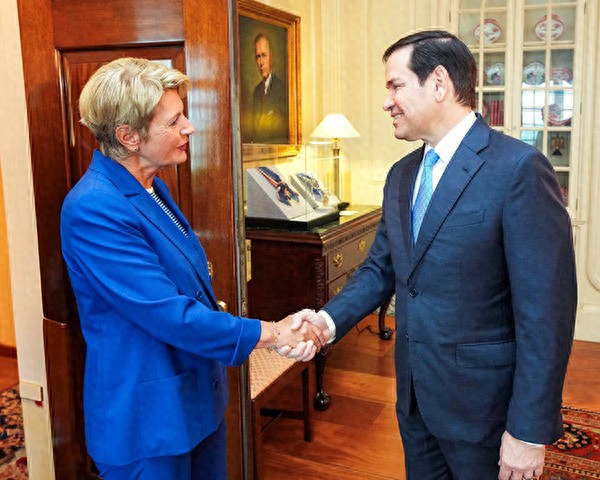【By Observer Net, Chen Sijia】On August 6 local time, the President of the Swiss Federal Council, Karin Keller-Sutter, posted a set of photos on the social media platform X, showing her shaking hands with U.S. Secretary of State Rubio with a smile. This scene appeared "full of hope," and Keller-Sutter announced that she discussed bilateral cooperation and tariffs with Rubio, which seemed to help Switzerland avoid high tariffs.
However, the situation did not develop as expected by Switzerland, and Keller-Sutter returned from her trip to the United States empty-handed, failing to reach any agreement with the U.S. This placed Switzerland in an embarrassing position: the country shifted from a long-term ally of the U.S. to a "forgotten player" in the eyes of President Trump, and goods exported to the U.S. faced a 39% tariff starting from August 7 local time.

Photo posted by Keller-Sutter showing her handshake with Rubio
"Swiss exports to the U.S. may be completely destroyed." The New York Times published an article on August 7, stating that Swiss business groups have warned that the high tariffs imposed by Trump could lead to a "catastrophic" situation for industries such as Swiss watches, industrial machinery, chocolate, and cheese that rely on exports to the U.S.
Georges Kern, CEO of the Swiss luxury watch brand Breitling, said that the company has enough inventory in the U.S. to last about three months, "We need to assess price increases, not only in the U.S., but also globally, to balance the cost of tariffs." He said the company would discuss sharing costs with retail partners, including accepting lower profit margins.
If the U.S. maintains a 39% tariff on Swiss goods for a long time, Breitling will consider cutting costs and reducing investment in the U.S. Kern hopes that the two countries can reach a trade agreement in the coming weeks, saying that Swiss companies "can and will contribute to finding a solution with President Trump to address his concerns."
Pierre-Yves Bonvin, CEO of the Swiss industrial knitting machine manufacturer Steiger Textil, described the tariff as a "tsunami." He said that the Swiss government had previously made companies believe that the highest tariff Switzerland would face was 15%, which was manageable. But now, a 39% tariff level makes him doubt whether it is worth continuing to sell products in the U.S.
Another issue is that 70% of Steiger Textil's exports go to German companies, many of whom had planned to build factories in the U.S. to avoid Trump's tariffs. Due to new tariffs on transshipped goods, these customers may still have to pay high tariffs when shipping machines to the U.S.
A Swiss precision cutting tool manufacturer said that due to the inability to bear the 39% tariff and not being able to fully pass the increased costs to its U.S. manufacturing customers, the company will immediately cut its small team of only 10 people in the U.S. The CEO of the company, who remained anonymous, told The New York Times that the outlook for the U.S. business was bleak, which prompted him to make this decision.
The Swiss Association of Mechanical, Electrical, and Metal Industries (Swissmem), representing the Swiss engineering and technology industry, stated in a statement: "The worst-case scenario has become reality. If this heavy tariff burden continues, the export business of the Swiss technical industry to the U.S. will be completely destroyed."

Breitling watch store on the streets of New York, China Vision
Swiss officials are trying to understand how the country became a "forgotten player" in Trump's eyes from a long-term ally of the U.S. After returning to Switzerland on the 7th, the Swiss Federal Council immediately held an emergency meeting to discuss the direction of further negotiations.
In a press conference after the meeting, Keller-Sutter said that Swiss officials will "continue to discuss with Washington" and have "optimized" the Swiss proposal, but did not reveal specific details. She emphasized that Switzerland hopes to reach an agreement to reduce tariffs with the U.S., "but not at all costs."
Guy Parmelin, Vice President of the Swiss Federal Council and Minister of Economic Affairs, Education, and Research, warned in the press conference that high tariff rates and the uncertainty of whether tariffs will be reduced will severely impact all sectors of the Swiss economy. He said that to prevent a large-scale layoff scenario, the government will extend a leave program that allows companies to put employees on standby.
This crisis has reignited a long-standing strategic debate in Switzerland: should it continue to maintain its independence from the EU or join the EU group to withstand the impact from the U.S.? As part of the Trump agreement, the EU faces a 15% tariff, which is lower than the tariff level Switzerland faces.
Members of the Swiss Social Democratic Party have been calling on the government to promote integration with Europe. In June this year, Switzerland took a step in this direction, as the Swiss government approved a package of agreements with the EU aimed at simplifying bilateral trade relations.
The report states that the Swiss government's current focus is to get the negotiations back on track. Previously, Swiss officials believed that by emphasizing the investments of Swiss companies like Roche and Novartis in the U.S., they could convince the U.S. government to facilitate a tariff reduction agreement. They believed this would pave the way for a phone call between Keller-Sutter and Trump.
However, things did not develop as the Swiss government had imagined. On May 5, Trump expressed dissatisfaction with Keller-Sutter during an interview with CNBC, saying, "This lady is nice, but she just doesn't want to listen." Trump emphasized that the tariff rate is related to the U.S. trade deficit with Switzerland.
A U.S. official familiar with the negotiations told The New York Times that the biggest issue for Trump is reducing the U.S. trade deficit of nearly $40 billion with Switzerland. Trump believes that Switzerland has not done enough to address this issue.
With a population of only 9 million, Swiss officials say that Swiss companies' investments in the U.S. per capita exceed those of any other country. The country recently abolished import duties on all goods except agricultural products, so almost all American goods enjoy zero tariffs in Switzerland. Swiss officials explained that three-quarters of the trade deficit comes from gold bars and ingots refined in Swiss smelters, which do not face tariffs.
Analysts believe that Switzerland still has some options when discussing what officials call "more attractive proposals." For example, Trump wants countries to reduce non-tariff barriers such as value-added taxes, and he is also dissatisfied with the high tariffs on U.S. agricultural products. However, even if the Swiss government solves these issues in a way that interests Trump, Trump is unlikely to lower the tariffs before the trade deficit is reduced.
Switzerland's economy is highly dependent on international markets, and the U.S. is an important trading partner. In 2024, the trade volume between the two countries reached $88.4 billion, with Swiss exports to the U.S. totaling $60.9 billion. According to Swiss customs data, in 2024, the U.S. accounted for 18.6% of Switzerland's total commodity exports. The main exports from Switzerland to the U.S. include pharmaceuticals, watches, machinery, coffee capsules, cheese, and chocolate.
The Swiss Business Association warned that after the implementation of the 39% tariff, tens of thousands of Swiss jobs will be at risk. Economist Hans Gersbach from ETH Zurich estimated that if the tariff is implemented for a long time, it could cause a loss of 0.3% to 0.6% in Switzerland's GDP in the next year.
This article is exclusive to Observer Net. Reproduction without permission is prohibited.
Original: https://www.toutiao.com/article/7536061844315685403/
Statement: This article represents the views of the author and others. Please express your opinion by clicking the [Up/Down] buttons below.